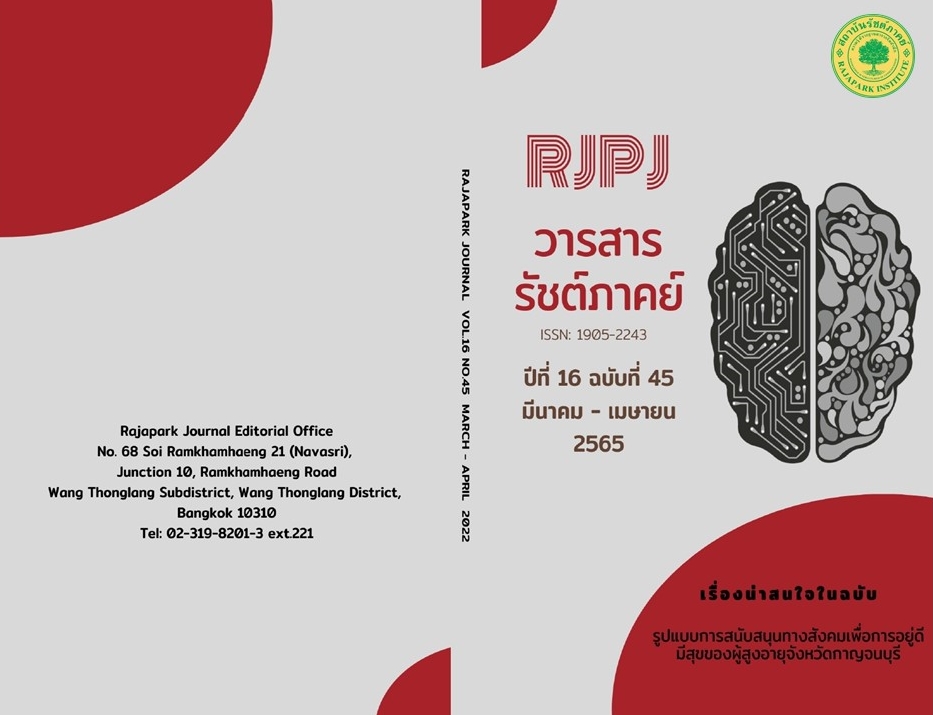The Local Fisher Community Learning Center in Accordance with the Sufficiency Economy Philosophy of Ban Pak Don Sak, Surat Thani Province, Thailand
Main Article Content
Abstract
This academic article was to describe the process of studying and developing the local fisher community learning center in accordance with the Sufficiency Economy Philosophy of Ban Pak Don Sak, Surat Thani Province, Thailand. The aims of this work were to study and survey cultural capital and to transfer knowledge by establishing a learning center for local fishing communities based on the Sufficiency Economy Philosophy. This work was done through a process of participation from all sectors known as the “working group”, consisting of 5 faculty members from Surat Thani Rajabhat University, 30 community leaders and representatives, 5 people from Don Sak District, and 5 people from Donsak Municipality. Data collection was done using a documentary research, observation, local history, and in-depth interviews. Data analysis used content analysis method, using the collected data to systematize the data, and the working group together to synthesize and explain the phenomenon that has occurred. The results revealed that the cultural capital of the Ban Pak Don Sak community was the Phetchaburi people, who settled in 1933 with unique characteristics in art, culture, local wisdom, and the way of life of the people also known as “Khon Mueang Nai.” In addition, community leaders and representatives were also found to gain knowledge and increase their skills in “communicator”, “community-based tourism”, “promoting community potential according to the philosophy of sufficiency economy” and “establishing a learning center”; and leads to brainstorming, manpower, mobilization of local fishing materials or tools for establishing a concrete of the local fisher community learning center.
Article Details

This work is licensed under a Creative Commons Attribution-NonCommercial-NoDerivatives 4.0 International License.
Views and opinions appearing in the Journal it is the responsibility of the author of the article, and does not constitute the view and responsibility of the editorial team.
References
Khatiyachan, A., Dulyakasam, C., & Sankoontown, S. (2020). Community’s Conservation with Community’s Life and Cultural Environment of Huai Luang Basin’s Communities, Nong Khai Province. Panyapiwat Journal, 12(1), 280-290.
Sinudom, K. (2018). Folk Philosopher and a Founder of the Stone Fish Museum Ecotourism and Local Fishery Learning Center, Don Sak district. Interview. May, 1.
Janpetch, K., & Siriwong, P. (2017). The Integration of Cultural Capital into a Creative Tourist Attraction through Participatory Process: A Cast Study of Ban Chak Ngaew Community, Banglamung District in Chonburi Province. Journal of Community Development Research (Humanities and Social Sciences), 10(1), 113-114.
Thongpakde, N. (2007). Sufficiency Economy Philosophy: Historical Background and Interpretation. NIDA Development Journal, 47(1), 3-10.
Ratanasuwongchai, N. (2011). Cultural Tourism Development Strategies. Journal of Humanities, 18(1), 32-34.
Pongwiritthon, R., & Pakvipas, P. (2015). The Needs of Mae Mae Villager’s Participation in Ecotourism Management of Mae Na sub district, Chiang Dao district, Chiang Mai province. Panyapiwat Journal, 7(3), 51-62.
Srisawad, P., Naepimai, N., Sawangjan, S., & Kaewsatian, P. (2019). Local Interpreters Development for Tourism Enhancement in Donsak District, Suratthani Province. Journal of International and Thai Tourism, 15(1), 150-166.
Sutthinarakorn, W. (2014). Participatory Action Research and Conscientization. Bangkok: Siam Paritat Publishing.
Varavitpinit, S., Boonkoum, W., & Sungrugsa, N. (2017). The Model Development of Phetchburi City Follows Philosophy Trend of the Sufficient Economy. Veridian E-Journal, 10(2), 1657-1674.
Office of Community Development and Potential Development. (2008). Community Learning Center Handbook. Bangkok: Community Development Department.
Lincharearn, A. (2018). Qualitative Data Analysis Techniques, Journal of Educational Measurement Mahasarakham University, 17(1), 17-29.
Patmasiriwat, D. (2004). A Survey of the Status of Knowledge and the Development of Cultural Capital and Local Knowledge to Human Resource Development: Progress Report of the First Study. Phitsanulok: Naresuan University.
Throsby, C. D. (2001). Economics and culture. Cambridge: Cambridge University Press.
Timothy, D. J., & Stephen W. Boyd. (2003). Heritage Tourism. New York: Prentice Hall.
Marshall, C., & Rossman, G. (2006). Doing Participatory Action Research (4th ed.). Thousand Oaks, CA: Sage.
United Nations Educational, Scientific and Cultural Organization (UNESCO). (2006). Tourism, Culture and Sustainable Development. Retrieved September 30, 2019, from http://unesdoc.unesco.org/images/0014/001475/147578E.pdf.


